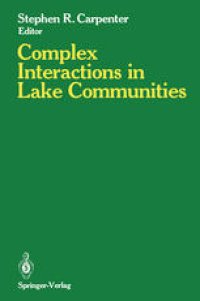
Ebook: Complex Interactions in Lake Communities
- Tags: Ecology, Zoology
- Year: 1988
- Publisher: Springer-Verlag New York
- Edition: 1
- Language: English
- pdf
In its statutory authority (National Science Foundation Act of 1950, as amended), the NSF is directed to both initiate and support basic scientific research. In its Ecology Program, one mode of initiating research is to en courage the development of new ideas through advisory workshops. The NSF is specifically directed to strengthen our nation's research potential. In addition, stimulating new approaches to research will continue to be prominent in the coming years as federal attention is given to increasing the innovativeness and competitiveness of the U. S. in science and engineering. A decision to initiate a workshop does not arise de novo in the Ecology Program. Rather, it emerges from panel discussions, conversations with in vestigators at meetings or on the phone, and from discussions between pro gram officers in the Division of Biotic Systems and Resources. This workshop was developed to provide advice to the NSF and the lim nological community. Some NSF perceptions on future funding for ecolog ical research on lake communities are presented here. Researchers often mentioned a paucity of innovative lake ecology at the community level. This perception was accompanied by a certain frustration since lakes probably have the best empirical data base of any natural environment and should continue to lead in the development of ecological concepts. Members of NSF advisory panels sometimes expressed similar concerns during consid eration of proposals for lake research.
Content:
Front Matter....Pages i-xviii
Introduction....Pages 1-8
Front Matter....Pages 9-9
Trophic Dynamics and Development of Freshwater Pelagic Food Webs....Pages 11-30
Complex Interactions in Oligotrophic Lake Food Webs: Responses to Nutrient Enrichment....Pages 31-44
Predator Regulation and Primary Production Along the Productivity Gradient of Temperate Lake Ecosystems....Pages 45-65
Front Matter....Pages 67-67
Microbial Food Webs in Freshwater Planktonic Ecosystems....Pages 69-83
From Picoplankton to Fish: Complex Interactions in the Great Lakes1 ....Pages 85-97
Front Matter....Pages 99-99
Temporal Variation in Regulation of Production in a Pelagic Food Web Model....Pages 101-118
Transmission of Variance through Lake Food Webs....Pages 119-135
Front Matter....Pages 137-137
Goals of the Discussion Groups....Pages 139-140
Food Web Interactions in Lakes....Pages 141-160
Size Structured Interactions in Lake Communities....Pages 161-179
Spatial Heterogeneity and Habitat Interactions in Lake Communities....Pages 181-208
Microbial Interactions in Lake Food Webs....Pages 209-227
Scale in the Design and Interpretation of Aquatic Community Research....Pages 229-258
Front Matter....Pages 259-259
Goals of the Synthesis Groups....Pages 261-261
Epistemology, Experiments, and Pragmatism....Pages 263-280
Back Matter....Pages 281-283
Content:
Front Matter....Pages i-xviii
Introduction....Pages 1-8
Front Matter....Pages 9-9
Trophic Dynamics and Development of Freshwater Pelagic Food Webs....Pages 11-30
Complex Interactions in Oligotrophic Lake Food Webs: Responses to Nutrient Enrichment....Pages 31-44
Predator Regulation and Primary Production Along the Productivity Gradient of Temperate Lake Ecosystems....Pages 45-65
Front Matter....Pages 67-67
Microbial Food Webs in Freshwater Planktonic Ecosystems....Pages 69-83
From Picoplankton to Fish: Complex Interactions in the Great Lakes1 ....Pages 85-97
Front Matter....Pages 99-99
Temporal Variation in Regulation of Production in a Pelagic Food Web Model....Pages 101-118
Transmission of Variance through Lake Food Webs....Pages 119-135
Front Matter....Pages 137-137
Goals of the Discussion Groups....Pages 139-140
Food Web Interactions in Lakes....Pages 141-160
Size Structured Interactions in Lake Communities....Pages 161-179
Spatial Heterogeneity and Habitat Interactions in Lake Communities....Pages 181-208
Microbial Interactions in Lake Food Webs....Pages 209-227
Scale in the Design and Interpretation of Aquatic Community Research....Pages 229-258
Front Matter....Pages 259-259
Goals of the Synthesis Groups....Pages 261-261
Epistemology, Experiments, and Pragmatism....Pages 263-280
Back Matter....Pages 281-283
....